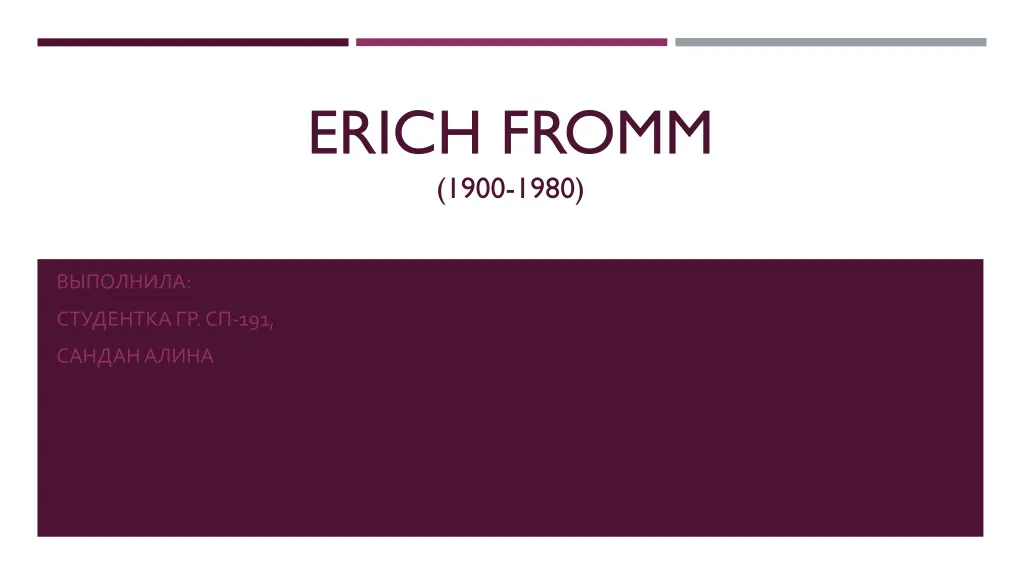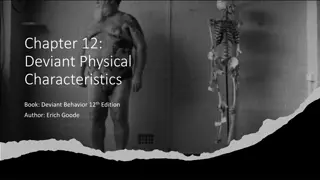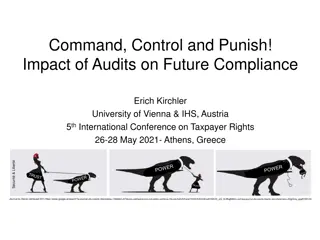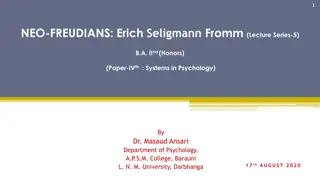
Erich Fromm - German Sociologist and Philosopher
Erich Fromm (1900-1980) was a prominent German sociologist, philosopher, and psychoanalyst. He was a representative of the Frankfurt School and a founder of neo-Freudianism and Freudomarxism. Throughout his career, Fromm combined ideas from psychoanalysis, existentialism, and Marxism to address the fundamental contradictions of human existence. He advocated for creating a healthy society based on humanistic ethics. Fromm's life and work spanned from his upbringing in a Jewish family to his academic pursuits in psychology and sociology, eventually leading him to Mexico and Switzerland in later years.
Download Presentation

Please find below an Image/Link to download the presentation.
The content on the website is provided AS IS for your information and personal use only. It may not be sold, licensed, or shared on other websites without obtaining consent from the author. If you encounter any issues during the download, it is possible that the publisher has removed the file from their server.
You are allowed to download the files provided on this website for personal or commercial use, subject to the condition that they are used lawfully. All files are the property of their respective owners.
The content on the website is provided AS IS for your information and personal use only. It may not be sold, licensed, or shared on other websites without obtaining consent from the author.
E N D
Presentation Transcript
ERICH FROMM (1900-1980) : . -191,
Erich Zeligmann Fromm is a German sociologist, philosopher, social psychologist, psychoanalyst, representative of the Frankfurt School, one of the founders of neo- Freudianism and Freudomarxism. Based on the ideas of psychoanalysis, existentialism and Marxism, he sought to resolve the basic contradictions of human existence. He saw the way out of the crisis of modern civilization in creating a healthy society based on the principles and values of a humanistic ethics.
BIOGRAPHY Erich Fromm was born into a family of orthodox Jews. His mother, Rosa Fromm, was the daughter of a rabbi who emigrated from the city of Poznan, which was part of Prussia at that time. Erich's father, Naftali Fromm, was also the son and grandson of the rabbis, and although he was engaged in trade, he maintained and maintained orthodox religious traditions in the family. Fromm attended the national school in Frankfurt. Fromm 1919 to 1922 he was a student at the University of Heidelberg, where the main objects of study were psychology, sociology and philosophy. Upon graduation, Erich Fromm received a Ph.D. Carried away by the ideas of Sigmund Freud, broke with previousvalues and priorities, showed great interest in the study of psychoanalysis, which he began to combine with practical medicine. Having completed the required psychoanalytic training, in 1925 he organized a private practice. It has become an inexhaustible source for observing people, studying the social and biological component in the human psyche. Heidelberg University
BIOGRAPHY Since 1930, E. Fromm taught psychoanalysis at the University of Frankfurt, from 1930-1933. holding the post of psychoanalysis consultant and director of the department of socio-psychological research at the Horkheimer Institute for Social Research. Fromm later perfected his knowledge of psychoanalysis at the Berlin Psychoanalytic Institute, and the acquaintances made here helped him to get to Chicago in the future. Already in 1932, he invited to give a course of lectures at the university of this American city. When the Nazis came to power in Germany in 1933, the next year to New York. In 1940, Fromm received American citizenship and worked as a teacher at Bennington College, was a member of the New York American Institute of Psychoanalysis. In 1943, assisted in the opening of the New York branch of the Washington School of Psychiatry, which was then reorganized into the Instituteof Psychiatry, Psychoanalysis and Psychology of W. White. Throughout 1946-1950 Fromm led this institute. In the years 1948-1949. He was an honorary professor at Yale University; He was also a professor at universities in Michigan and New York.
BIOGRAPHY The biography period from 1951 to 1974 was associated with living in Mexico, working as a professor of psychology at the National Autonomous University (until 1965). In 1960, the psychologist became a member of the US Socialist Party and even wrote a program for it, which was never accepted as the basis. Fromm combined research and teaching with political participation. In 1962, he was one of the observers who attended the disarmament conference in Moscow. Having suffered a heart attack in 1969, Fromm, who also suffered from tuberculosis, began spending the summer in Switzerland. In 1974, he finally moved to this country, his place of residence was Muralto or Locarno. In 1977 and in 1978, he suffered a second and third heart attack, respectively, and died in 1980, March 17.
THE MAIN ACTIVITIES. CONTRIBUTION TO PSYCHOLOGY Fromm's main discovery is related to the recognition of the social conditioning of the theory and therapy of psychoanalysis. In contrast to Freud s point of view, the analysis proposed in this book is based on the assumption that the key problem of psychology is the special kind of connection of the individual with the outside world, and not the satisfaction or frustration of certain human instinctual needs. Fromm says that the character of a person has not only libidinal, but also social conditioning. Here the main role belongs to the family, but after the end of the period of childhood, society continues to actively influence. In connection with the understanding of the decisive role of society and in accordance with the central principle, according to which a person should be in the center of society and the goal of its development, all economic and political activity should be subordinated. Fromm is considered the most socially oriented of all psychoanalysts, since for him the social environment was not just a condition, but the most important factor in the development of personality. At the same time, Fromm understood by environment not only the immediate environment of a person, his family and relatives, but also the social structure in which he lives.
THE MAIN ACTIVITIES. CONTRIBUTION TO PSYCHOLOGY Fromm came to the conclusion that the driving forces of personality development are two congenital unconscious needs that are in a state of antagonism: the need for rooting and the need for individualization. These two needs are the cause of internal contradictions, a conflict of motives in a person who always tries in vain to somehow connect these opposite trends in his life. The desire to reconcile these needs, from Fromm's point of view, is an engine not only of individual development, but also of society as a whole, which is also trying to balance these aspirations. The only feeling that Fromm believes helps a person to reconcile these two opposite needs is love. Fromm spoke of the need to build a new society on Earth - "humanistic idealism", based on the love of people for each other. Fromm also spoke of psychological defense mechanisms by which a person seeks to avoid intrapersonal conflict. It is sadism, masochism, conformism, and destructivism.
THE MAIN ACTIVITIES. CONTRIBUTION TO PSYCHOLOGY Fromm concludes that there are two ways to realize one s inner nature: the way to be and the way to have. People who live in order to have, are oriented to the outside, to rooting in society. For them, the main thing is to demonstrate their value, to give themselves weight in the eyes of others. It doesn t matter at the expense of what they want to give themselves significance, what they want to possess - knowledge, power, love or religion. Development by the principle of being is characterized by inner freedom and self-confidence. Such people do not care what others think about them, since the main thing for them is not to demonstrate possession of knowledge, religiosity, power or love, but to be, to feel like a loving, religious, knowledgeable person. In this, individuality is realized, an understanding of one's self-worth. Such people do not seek to break ties with others, to freedom from everything. They need only freedom for self-realization, in order to be themselves.
Later works in English Escape from Freedom (U.S.), The Fear of Freedom (UK) (1941) Man for himself, an inquiry into the psychology of ethics (1947) Psychoanalysis and Religion (1950) The Forgotten Language; an introduction to the understanding of dreams, fairy tales, and myths (1951) The Sane Society (1955) The Art of Loving (1956) Sigmund Freud's mission; an analysis of his personality and influence (1959) Zen Buddhism and Psychoanalysis (1960) May Man Prevail? An inquiry into the facts and fictions of foreign policy (1961) Marx's Concept of Man (1961) Beyond the Chains of Illusion: my encounter with Marx and Freud (1962) The Dogma of Christ and Other Essays on Religion, Psychology and Culture (1963) The Heart of Man, its genius for good and evil (1964) Socialist Humanism (1965) You Shall Be as Gods: a radical interpretation of the Old Testament and its tradition (1966) The Revolution of Hope, toward a humanized technology (1968) The Nature of Man (1968) The Crisis of Psychoanalysis (1970) Social character in a Mexican village; a sociopsychoanalytic study (Fromm & Maccoby) (1970) The Anatomy of Human Destructiveness (1973) To Have or to Be? (1976) Greatness and Limitation of Freud's Thought (1979) On Disobedience and other essays (1981) For the Love of Life (1986) The Art of Being (1993) The Art of Listening (1994) On Being Human (1997)









